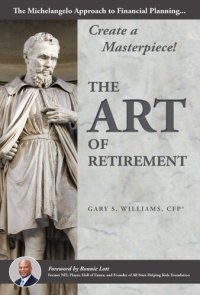What is your definition of a fulfilling life and how does an enjoyable retirement fit into that vision? Life is short; we have a limited time to choose our path, reach or dreams and goals and make our lives gratifying and our legacy everlasting. I wrote The Art of Retirement to serve as a guide; a book to help you with your life's journey by educating and inspiring you to make the most of your time on this planet or as Ronnie Lott would say, "Exhaust life." Retirement planning is much more than making sure you have enough money. Of course this is important and thoroughly discussed; certainly the security and lifestyle that money provides is a key part of your life. However, the financial aspect of planning your retirement is just part of the picture. Life is like art in many respects. It is unique to each one of us. It has the opportunity to be great as well as the potential for less-then-desired results. Like a sculpture, it can be molded and changed. Or like a painter standing in front of a blank canvas, the future is limited only by creativity and resources—whether that is money or the number of colors available for your palette. In keeping with the art metaphor, I have woven the story of Michelangelo's life and art into The Art of Retirement to help you create your own life's masterpiece. As you read this book and begin the process of creating your masterpiece, you will:
Gain perspective on what you value. I will share the story of my dear friend and former NFL player, O.J. Brigance, and his battle with ALS to help you gain perspective and appreciate even with adversity (i.e. poor health, poor investment performance, unable to save enough, etc.) you can still strive to achieve the most rewarding life given your circumstances.Understand how your emotions (and decisions) can be impacted by our 24/7 access to financial news through broadcast media, print media, and the Internet. Being armed with knowledge of behavioral finance will allow you to avoid costly mistakes due to how our brain deals with money and financial issues.Be inspired by real-life stories of people: o Who turned hobbies into second careers o Who used the skill set they learned in the business world to improve a non-profit organization o Who used their unique skills from their occupation (i.e., eye doctor) to help those less fortunate around the worldLearn the difference between planning retirement haphazardly without a plan, using rules-of-thumb, or using financial planning software to analyze retirement needs to compare to your resources.How to accurately determine your risk tolerance and capacity, the most important and first step to building an investment portfolio.Gain perspective of how investments behave while understanding current and potential future economic trends that may affect the traditional approaches of investment management.Learn when active vs. passive management may be the best investment solution and how to implement alternative investments, such as hedge funds and private equity, to potentially minimize risk through diversification while increasing investment performance.Introspectively look at your life to determine if you have the time, training and temperament to manage your own investments and plan for your retirement.Appreciate the differences among the multitude of advisors and how to select a competent one that can become your trusted partner.Through the lens of both my personal life and experiences—raised by my father and growing up in a blue collar, welfare-dependent home—and through my occupation as a CERTIFIED FINANCIAL PLANNER™ practitioner, I will share my experience and knowledge to...
